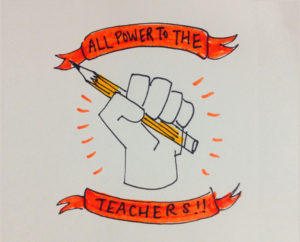
Jake Asbell is an English and Advancement Via Individual Determination (AVID) teacher at Godby High School in Tallahassee, Florida. AVID is a college preparation program usually aimed at supporting low-income students, often students of color. He is a member of the Leon Classroom Teachers Association and site coordinator for Godby’s AVID program. He is also a soccer coach and a candy-maker at a local sweets shop.
THE DICTATORSHIP OF STANDARDIZED TESTING
In the 1990s, neoliberalism cemented its grasp on the US public education system. The first Bush administration and the Clinton administration agreed that they wanted to know that public investments in education were “getting a good return.” The accountability movement arose as a means to facilitate the defunding of public education. Standardized testing adopted a high-stakes character; beyond high school graduation and college admission, teachers could be fired or rewarded, and entire schools funded or defunded, on the basis of test grades. Schools in working class neighborhoods (already struggling because school funding is dictated by neighboring property values) now receive even less money. Standardized testing is used as a scapegoat by profiteers and union-busters to blame educators, rather than the massive inequalities and contradictions produced under capitalism, for our floundering students and crumbling education infrastructure.
S: It sounds like a lot of your strategizing as teachers revolves around what standardized testing requires of students?
J: Because of the way politicians have pigeon-holed us through these standardized tests, education has become less about teaching and more about putting out fires. We don’t have enough time to teach these students what we really need to teach them, especially if they’re grades behind. A lot of our kids are reading on middle school grade levels and that’s not gonna pass the Florida Standards Assessments (FSA), unfortunately. It doesn’t really matter what their background is, the majority of them are reading-deficient. Almost all of them are reading below where they should be at this level.
Teaching writing could be its own class. Certain high schools actually do that; when I taught in Wakulla County, we had a 9th grade writing course. But once the FSA came along and we knew that the writing portion was such a small percentage of the overall grade, we felt like the average student is gonna write you a five or a six [out of 10], just by putting words on paper. That’s more than enough to get that percentage. Now if we could get them to pass the reading, they could be mediocre in their writing and they could still gonna pass the FSA … so after that, Wakulla got rid of their 9th grade writing course.
If we wanna be highly certified—and that’s tied to money and incentives, which it shouldn’t be, because that’s a corporate construct that does not work in education—then we need to put emphasis on helping these students pass this test.
BEGGING FOR SCRAPS: LOW FUNDING FOR PUBLIC SCHOOLS
Florida schools are among some of the most underfunded in the United States, ranked 42nd nationally in education spending per-student, which hovers at a dismal $8,800; in comparison, per-inmate spending in the Florida Department of Corrections is about $19,000. Florida invests more than twice as much in its prison system versus its education system. In response to this funding crisis, teachers unions represented by the Florida Education Association (an affiliate of the American Federation of Teachers and the National Education Association) have launched the #FundOurFutureFL campaign, demanding better investment in our traditional public schools.
S: What problems have you encountered due to poor funding for Godby?
J: Every teacher got $275 [for school supplies] this year, which is a lot more than we’ve typically gotten. The issue is that $275 typically pays for copy paper that I need because the county will only supply us with one box of paper per semester. I go through about four boxes of paper per semester. For the computers that we have in the classrooms, I’m a 1:1 classroom which means every student has a computer here, which is really nice. But the computers typically have problems that I have to troubleshoot myself on the fly. It frustrates the students to no end. A lot of times, if things don’t work they’ll throw their hands up and it’ll derail your entire lesson. And with [regards to] internet capabilities, we’re always having issues with our wifi.
I think a lot of the “haves” don’t care whether or not the “have nots” are educated, and that’s really sad to think about. What happens to our country overall if we’re not educated? If the average person in the US can’t read or write, what does that do to our society?
WORKING THREE JOBS TO SURVIVE
In addition to Florida having some of the lowest-funded schools in the United States, Florida education workers are among the lowest paid. Teachers rank 46th in pay and support staff rank 47th. The statewide starting salary is $41,000 and some counties start even lower, around $38,000. Florida’s average teacher salary is more than $10,000 less than the national average. After taxes and healthcare costs, Jake’s yearly salary hovers around $28,000. Currently, Florida is experiencing a teacher “shortage crisis,” desperately struggling to recruit and retain qualified educators. Projections indicate that there will be about 10,000 open teaching positions statewide at the end of the 2018-2019 school year.
S: What is your pay?
J: Every month, I take home about $2,200. I am [lucky to be] a homeowner but it’s really hard to afford homeownership when your septic tank leaks and you have to fix that and it’s $2,000, or your water heater busts and you’ve gotta come up with another $2,000. Just to replace a household appliance is my entire paycheck for a month.
S: How many hours do you work each week?
J: On average, I work about 65 hours a week.
I used to get paid a little bit extra to do high school soccer, but that in and of itself was another full-time job. You could ask my girlfriend; I was leaving home at 6:30 in the morning and coming to school to teach all day, and then I had soccer practice or a soccer game—and let’s say we were traveling to Panama City—I wouldn’t come home until 1:00 in the morning. Then I gotta get up and do it all over again. We figured it out: in your “hourly rate” as a coach, you’re getting paid less than minimum wage. But because it’s a part of the contract language, it’s just a salaried position. I was working double, triple overtime as a head coach and I was taking home an extra $600 a month, maybe. It was nice in the paycheck when it came, but I was also exhausted.
I used to teach Extended Day, which is beyond our contract—meaning you would take on one or two extra classes to teach during the day. You might give up your planning period in order to do it and they would pay you a little bit extra. But the extra money that they pay you for those classes is actually lower than your hourly rate based on your career salary! So is it a good deal? No, not really. But a lot of teachers do it, give up their planning period to make an extra buck, even though it’s not fair to us.
Think of how effective I could be at teaching if that’s all I had to focus on. Think of how much better I could be at my job if instead of going in to work at another job for minimum wage in the afternoons, I was lesson planning! When I first started teaching, I didn’t take on extra jobs and I just struggled. I somehow made it work with that measly paycheck because I really wanted to focus on teaching. Now, if I’m at another job doing something else, my mind cannot be on teaching. I can’t make my lessons better. What happens often times is that I get home and I want to spend my brain-power [thinking about teaching] and I can’t sleep. I’m up until 2:00 in the morning worried about this or that. I worry about my students all the time—just their safety in general—and then I come to school in the morning on four hours of sleep. Now, I’m not as effective of a teacher.
S: Do the majority of your co-workers also work extra jobs?
J: I think almost all of us work multiple jobs. The vast majority of us have summer jobs, if not weekend jobs. People work as receptionists at yoga places or they wait tables, and the burnout is real. But if we don’t do those things, when we finally have a tiny fraction of time we can spend with our families and we say, “Look, I’m going to take off for two weeks because we need a vacation,” we wouldn’t be able to afford to go anywhere. We couldn’t afford a hotel, or the gas. If we don’t do those things, when we do finally get to the points where we really have some time to spend with our families, then the money isn’t there to do anything.
VOUCHER PROGRAMS AND CHARTER SCHOOLS: EDUCATION’S PARASITES
When Betsy DeVos was appointed Secretary of Education in 2017, it signaled a nationwide commitment to the charter school project that had been creeping across school districts and states since the early 1990s. The “school choice” movement is a well-propagandized measure to privatize our public schools and roll back the educational gains of the Civil Rights Movement. Charter schools are publicly-funded schools that are privately managed. Many charter schools are run by corporations; one of every six charter schools is a for-profit institution. 90% of charter schools are non-unionized and their educators are actually paid less on average than public school teachers. Charter schools pave the way for voucher programs, which allow families to rely on public funding in order to pay for their child’s private tuition. In Florida, the “Schools of Hope” program, which allows charter schools to open in so-called “opportunity zones” (ie. neighborhoods with low-funded, and thereby low-performing public schools) have been championed by former Speaker of the House Richard Corcoran, Governor Ron DeSantis’ nominee for Commissioner of Education. His wife, Anne Corcoran, is the founder of Classical Preparatory School in Pasco County, a charter franchise seeking to expand statewide.
S: How do you see the proliferation of charter schools changing the landscape of education?
J: Regarding DeSantis, everyone loves the fact that it seems he’s giving more money to Florida students; he’s going to increase the per-student budget while, of course, increasing voucher funding too. As a public educator, I’m expected to say, “Yes, thank you! You’re giving my kids money!” But, he’s also empowering the leeches to take more money from us and use it for whatever corporate means they want. So yeah, great, he’s giving us more money. He’s also incentivizing charter schools to steal more money from us.
It’s crazy to think the same people who are legislating for charter schools [are the ones who] own charter schools! Richard Corcoran’s wife is an owner of charter schools. He’s finding ways to pay his wife more money to offset costs at her school. If she wants to build another one—which she is, right here in Tallahassee!—they can grease the palms over at the Leon County School Board.
These people want us to feel like we can’t do this work and be successful in our personal lives at the same time. They want us to quit so they can replace us with people who are not qualified, but who they can pay significantly less. If you look at the payrolls on charter schools, this is how they’re footing the bill. They’re paying their teachers significantly less than I make now—I don’t know how those people are surviving! They get paid on average between $5,000-$10,000 less [than public school teachers] per year.
I will never, ever work for a charter school. I will quit and I will bag groceries at Publix before I work at a charter school. You cannot pay me that little and think I would feel valued. It’s utterly ridiculous.
UNION-BUSTING: A SWIFTLY APPROACHING DEADLINE
In 2018, the Florida legislature passed House Bill 7055, which created a new tax-credit voucher program for the Schools of Hope project. Buried in the legislation is a dangerous union-busting provision which essentially stipulates that each union locale that does not reach 50% membership by the end of 2019 will be decertified. According to their website, the Leon Classroom Teachers Association currently represents about 800 workers; there are over 2,000 teachers in Leon County. It is difficult to convince many educators—already struggling to make ends meet—to make the financial sacrifice of paying union dues. There are less than eight months left to either meet the 50% membership requirement or militantly mobilize in defense of the union.
S: What has been your experience with the Leon Classroom Teachers Association?
J: I would say frustrating, but it’s not their fault. Frustrating in the fact that I want them to do more, but they can’t do more without more membership and more money and more power. Sometimes, it seems like we’ve exhausted the amount of teachers who would have been willing to join. And I get it, when you’re a first-year teacher, you’re thinking, “An extra $70 out of my paycheck a month?” That’s a lot of money when you get paid sh*t. And when you think about the history of [unions] and see people in the past haven’t contributed to the union but they still get the raises, you might have a hard time figuring out why you should give them that money in order to fight on your behalf if they’re going to do it anyway.
But the union’s great. They do a lot of stuff for us. We’re monetarily incentivized too! There’s tons of breaks on things like insurance, common things that actually save you more than $70 a month. The dues pay for themselves.
S: But now the union is on the verge of being decertified.
J: I would hope that [would encourage] some of these teachers to change their mind about joining, but many of them them haven’t. These are probably the same teachers who are looking at this career and thinking, “I’m not going to even be here next year, so why would I give you $70 a month when I could be saving that? I don’t care about the bargaining power of the union next year because I’m not going to be here.”
I’m on the fence as to whether or not the union being decertified is going to mean I’m coming back. Already, [me and my co-workers] are grading after hours. We’re team planning. We go outside of our contract every single day. I just want to be compensated and if I don’t have a voice through my union or the ability to negotiate my contract anymore, that scares the sh*t out of me. They’ve already made it so that we can only have one-year contracts. There’s no job security here. Now you’re going to take away our ability to negotiate? What’s to say next year, the school board just decides to cut all of our wages by 15%? How are we supposed to fight that?
I feel forced into quitting the work that I’ve spent my entire educational and post-educational career becoming. It makes me wonder, did I waste my time? Was it all worth it? And [thankfully] I can say I wouldn’t have done anything else. If I quit at the end of this year, I wouldn’t have done it any differently.
NATIONWIDE EDUCATORS REVOLT: FLORIDA TEACHERS HELD BACK
One year ago, 20,000 classroom teachers and thousands more support staff in West Virginia went on strike, demanding better pay to cover cost-of-living increases and health insurance. Their energy and enthusiasm resulted in much-needed victories, including a 5% pay raise for all West Virginia public employees. They ignited a nationwide movement; in 2018, the strike wave spread to Oklahoma and Arizona and smaller-scale protests erupted in Kentucky, North Carolina and Colorado. In January 2019, more than 30,000 educators in the second-largest school district in the US went on strike; the United Teachers of Los Angeles strike alone dwarfed the total combined number of striking workers in 2017 nationwide. Since then, West Virginia teachers have gone on strike again, as well as Oakland, Denver and Sacramento educators. In contrast, Florida teachers have not gone on strike in 50 years. Florida is one of three-fifths of states in which it is illegal for teachers to go on strike. For this reason, many Florida educators feel that their hands are tied. Union leadership shies away from militant labor tactics, fearing that members might lose their certification or even face jail time. However, we must remember that in West Virginia it was illegal for teachers to strike too. But when they walked out anyway, they reignited a militant labor movement that has not just inspired fellow teachers, but workers in all industries across the US.
S: Have you and your co-workers been talking about the teachers strike wave around the US? Is there hope and inspiration, or is it taboo to talk about at all?
J: It’s kind of both. We do talk about it, but I think a lot people are skeptical about other teachers’ fervor for [militant actions]. If you can’t get 50% to join the union, how are you supposed to get 50% to fight for education? And because it’s illegal in Florida to walk out or strike, we can lose our certification … it does become a taboo to talk about strike in Florida.
It’s bullsh*t! To think that we don’t have the right to stand up for our students and ourselves? To do what every other state is seeing its teachers do—leave their classrooms, go out and protest? Money is the only thing that changes anything. The Civil Rights Movement worked because when you boycott buses, when you sit at lunch counters, when you [force them] to start losing money and they can’t stay profitable? Then they come to the bargaining table. So where’s the money in education? Who do we fight against to get them to pay attention? These other school unions [such as] in West Virginia, when every single teacher takes off for a day, [the district] has to pay for a lot of substitutes. That’s a lot of money. And in public school systems, we have substitute teacher budgets but there’s never enough to actually cover everyone who needs to be covered.
Because we’re not “allowed” as Florida teachers to just get up, walk out, and go to the Capitol Building to protest our case, we don’t have the ability to put the monetary pressure on our school system. It’s really easy to say no to one person. But, when we have the ability to walk out and say, “Fine, then you don’t have a workforce,” then it’s impossible to say no to everybody.
THE UNION MAKES US STRONG
Unions are one of our best weapons against education privatization. In unity, there is strength. When workers can collectively bargain for their rights, when they have a seat at the table, they can win major victories. Unionized workers make 30% higher wages on average than non-unionized workers. They have better job security, pension plans and health coverage. Without unions, we cannot fight for ourselves and our students.
S: What would you tell someone who’s on the fence about joining the union to get them to join? Why do you think it’s important for teachers to join the LCTA?
J: If you lose your bargaining ability, you lose your ability to hold on to what you now have. I think a lot of people think that there’s a bar that’s set for our wages and our contracts and they believe that bar can’t be taken away. It can. At a moment’s notice, the school board can just say “We’re going to pay you [even less].” And if we have no vote, no voice, no ability to go to them and stand up for ourselves, then we’re losing our ability to keep what we already have. And we’re also now losing our ability to get anything else. It’ll only ever stay the same or get worse.
If you are fine with the same and/or worse, then don’t join the union. But if you want to be able to survive in the future, if you believe there’s hope for education, if you believe that one day maybe they will pay us what we’re worth, if you believe that one day we can fight for the contract that is reasonable? Then join. Or you’re never going to see that happen.
—
Jake is a frequent community contributor to the Tallahassee Democrat. You can read his op-eds on education here:
Teacher salaries far too low for what dedicated educators give
Seizing control of public education is a family affair
Bill to lower teacher standards won’t solve teacher shortage






